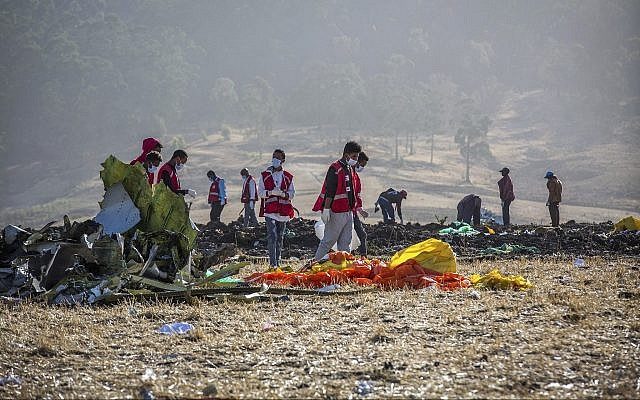Relative of one of the 157 killed in the crash says impact site left in disarray, with belongings and remains scattered on the ground, exposed to the elements
Over a month after an Ethiopian Airlines flight crashed 62 kilometers (39 miles) south of Addis Ababa airport en route to Kenya, families of the victims have yet to receive their loved ones’ remains and belongings as local authorities are preventing rescue workers from collecting them.
People close to one of the victims, who asked not to be named, and the head of ZAKA, an Israeli emergency response organization that collects human remains for burial, each described the situation around the impact site as a confusing mess, with human remains and personal effects exposed to the elements and seemingly open to looters and animals, but not to official search efforts.
“What I personally found on the crash site left me shocked. Among many things, I collected legible business cards, a vaccine booklet, and an agenda. Each of these had vividly readable names and surnames, and were just left on the surface, completely unattended,” a family member of one of the victims wrote in an email to The Times of Israel. For privacy reasons, she asked to remain anonymous.
The relative said she had felt compelled to visit the impact site after receiving distressing and often contradictory updates about the search efforts.
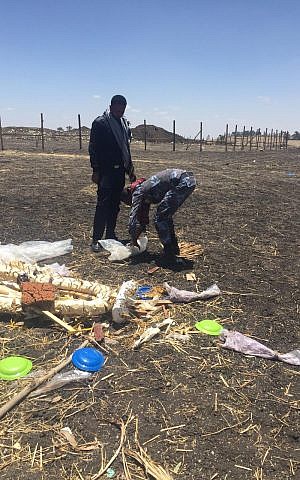
“To my dismay, we also found what looked like remains of human bones, which were then handed over to the guardians in the military tent, just outside the site of the crash,” she said.
The family member added that these remains were then not treated delicately by the guards but were “wrapped using some mere plastic found on the ground.”
On March 10, the Boeing 737 MAX 8 Ethiopian Airlines Flight 302 went down six minutes after takeoff, apparently due to a technical malfunction, killing all 157 people on board. The victims were from 35 countries all over the world, including Kenya, Israel, Canada, Italy, China, Ethiopia and the United States.
(The two Israelis killed in the crash were Avraham Matsliah, 49, from Maale Adumim, and Shimon Reem, 55, of Zichron Yaakov. The source who was in contact with ToI is not a relative of the Israeli victims.)
The plane struck the field outside the town of Bishoftu at over 1,000 kilometers an hour, causing an 80-meter by 80-meter (260-foot by 260-foot) crater.
The impact site was initially blocked as local investigators worked to determine the cause of the crash, but weeks after the black box and other crucial pieces of evidence were retrieved, the area remains closed.
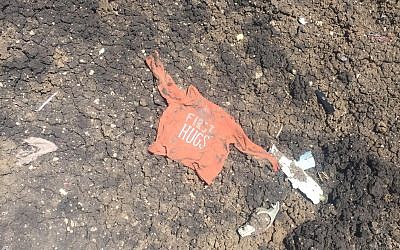
Photographs from the scene that were given to The Times of Israel show fragments of the plane, socks, shoes, torn clothes, and a child’s sweater with “First hugs” written on it — all still scattered around the impact site a month after the crash.
In the days after the accident, Israel said Prime Minister Benjamin Netanyahu, who also serves as foreign minister, and other senior officials were working with their Ethiopian counterparts to get ZAKA and others access to the site.
“Unfortunately, appeals to Ethiopian authorities are not, for the time being, bringing the long-awaited results,” Israel’s Foreign Ministry said in a statement on March 14.
The co-founder and head of ZAKA, Yehuda Meshi Zahav, told The Times of Israel on Sunday that he had again discussed the matter with Netanyahu on April 12.
According to Meshi Zahav, the prime minister shortly thereafter spoke to Ethiopian Prime Minister Abiy Ahmed, who said his government was prepared to grant the search teams access to the site.
Around the same time — on April 14 — Netanyahu dispatched a team of Israeli firefighters to assist Ethiopia in combating a massive wildfire in the country’s Simien Mountain range.
The foreign ministries of Israel and Ethiopian refused to confirm that this conversation took place or comment on what terms, if any, were reached in an agreement to open the site to search efforts.
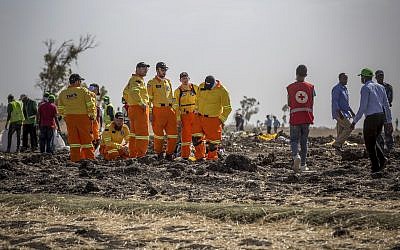
Meshi Zahav said that despite the Ethiopian prime minister’s apparent agreement to allow the collection of remains and belongings to begin, his group was waiting for confirmation that this directive had indeed “reached the people on the ground.”
“We plan to go back to Ethiopia after Passover, if we have all the necessary approvals,” Meshi Zahav said. The week-long Passover festival ends Friday, April 26.
The ZAKA chief said his organization had even offered to purchase the impact site in order to gain access to it, but were rebuffed by Ethiopia.
“It’s an 80-meter by 80-meter piece of land, how much could it cost?” Meshi Zahav said.
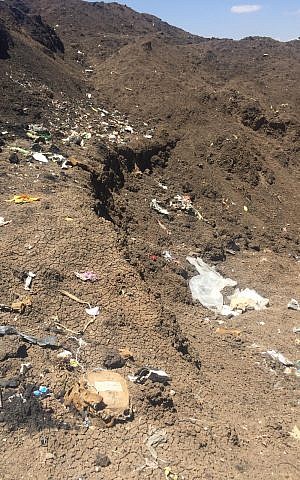
The force of the impact showered debris approximately a kilometer (0.6 miles) in all directions and meant that most of the human remains would be small — individual fingers, hands, fragments of bone — rather than intact bodies.
“There’s a lot of work to do,” Meshi Zahav said.
He surmised that Ethiopia’s opposition to opening the crash site came from concerns over the cost and effort required in overseeing such an operation, coupled with a lack of understanding of its importance.
For most people and faiths around the world, physical remains are not necessary in order to perform a complete religious funeral. However, this is a necessity for Jewish burials. Despite the delay in retrieving the remains, a special rabbinic court ruledlate last month that the families of the two Israeli men killed in the crash may begin the traditional mourning process for their loved ones.












